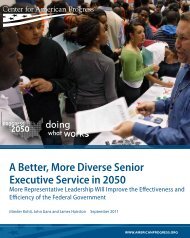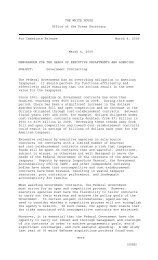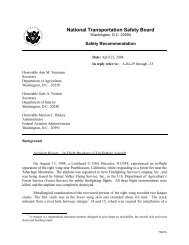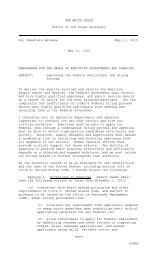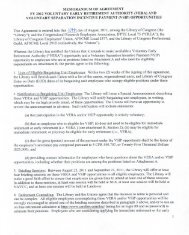Accenture's fifth annual global e-government study
Accenture's fifth annual global e-government study
Accenture's fifth annual global e-government study
Create successful ePaper yourself
Turn your PDF publications into a flip-book with our unique Google optimized e-Paper software.
The citizens’ view<br />
Future priorities 3<br />
In general, countries’ future priorities should be to<br />
develop and promote the convenience and security<br />
of eGovernment services. In addition, expanding and<br />
promoting simple-to-use transactional services<br />
should be a key focus. People who use transactional<br />
services tend to have higher levels of satisfaction<br />
and a more favorable opinion of their <strong>government</strong>’s<br />
performance than those who use informational<br />
services alone. Simple transactions should bring in<br />
new users and, if trends hold, positively influence<br />
attitudes toward eGovernment overall.<br />
The effective bundling of services also may help<br />
take-up. Singapore and Japan, for example, have had<br />
success bundling services related to starting a new<br />
business. Quick and immediate access to a group of<br />
services means there is greater likelihood that citizens<br />
will use them.<br />
More specific priorities can be seen when countries<br />
are divided into categories based on Internet penetration<br />
rates. For each of the country types—high,<br />
medium and low penetration—we have divided<br />
eGovernment services into quadrants based on<br />
usage, interest and impact of the service.<br />
• Critical improvement: These are services of high<br />
interest and of high potential use and impact.<br />
They should be among the immediate priorities for<br />
development.<br />
• High leverage: These are services that already<br />
are strong and of high impact and interest.<br />
Government should spend more time promoting<br />
these services.<br />
• Less critical improvement: These are services that<br />
are used infrequently, of little interest to users and<br />
of low impact to <strong>government</strong>.<br />
• Low leverage: These are services that are fairly<br />
strong but where development of the service is<br />
unlikely to add additional value. The emphasis<br />
should be on promotion for these services.<br />
High-penetration countries.<br />
In high-penetration countries, renewing or applying<br />
for passports, drivers’ licenses, marriage certificates<br />
or birth certificates are all key services to develop<br />
and promote (see Figure 13). Online health information<br />
is another priority area that will drive overall<br />
satisfaction—it is likely to be high impact, but there<br />
is capacity for improvement in quality. In contrast,<br />
applying for benefits or <strong>government</strong> jobs online are<br />
currently less critical improvement areas. These are<br />
services less frequently used and of less interest to<br />
nonusers. Filing taxes is not a critical improvement<br />
area in high-penetration countries, probably reflecting<br />
its already high rating among users. However,<br />
because it is a high-impact service of high interest<br />
to users, <strong>government</strong>s should continue to promote it.<br />
Medium-penetration countries.<br />
Tax services online represent high-leverage services<br />
in medium-penetration countries—they drive satisfaction<br />
and are highly rated. Looking for health<br />
information is an area where improvement is<br />
required—it can have a high impact on overall<br />
satisfaction and is of interest to citizens, but is<br />
underused (see Figure 14).<br />
Low-penetration countries.<br />
Online tax services are a major driver of eGovernment<br />
performance in low-penetration countries, as they are<br />
already highly leveraged. Searching for <strong>government</strong><br />
jobs online may be a key area for improvement. This<br />
is an underused service that would likely have a<br />
positive impact on overall satisfaction. Experience<br />
levels tend to be lower for eGovernment services<br />
such as searching for <strong>government</strong> jobs and determining<br />
benefits eligibility in these countries; however,<br />
these services may hold great appeal and may be<br />
key to encouraging initial usage of eGovernment<br />
(see Figure 15).<br />
3<br />
We note that the recommendations we make in this section are based primarily on the results from this citizen survey, which did not cover all 206 services<br />
of the main research. Thus, there may be other services that fall into the categories of critical improvement and high leverage. While these priorities provide<br />
a starting point, we emphasize that <strong>government</strong>s need to conduct their own research on their citizens to focus their efforts most accurately.<br />
34




